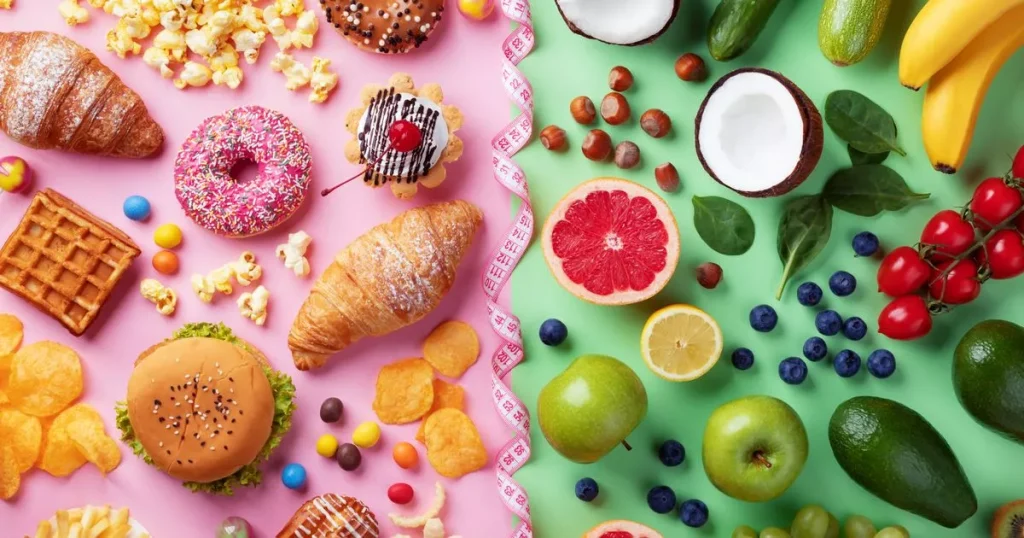Video LoadingVideo UnavailableClick to playTap to playThe video will auto-play soon8CancelPlay now They say you are what you eat, so little wonder the debate around ultra-processed food continues to rage. With confusion around what constitutes UPF – and its potential effects on our health – now is the time to become informed about what we put on our plates. What is ultra-processed food? More than half of the calories that the average person in the UK eats come through ultra-processed foods. Nutritionists use the Nova system to classify foods in four categories, with natural wholefoods in group 1 and UPFs bottom of the pile in group 4. They often include many ingredients you would not use in your own kitchen, including preservatives, emulsifiers, sweeteners, artificial colours and flavours. Unprocessed, healthy foods including fresh fruit, vegetables, lean proteins and wholegrains, can go a long way in promoting better health and wellbeing. But the cost-of-living crisis, rising cost of high-quality foods and a lack of education around eating has pushed many of us further into the convenience food aisles.
The debate rages on as to what foods we should, and shouldn’t, be eating
(Image: Getty Images/iStockphoto)
Read More
Related Articles
Marnie Simpson unveils incredible garden transformation with husband Casey Johnson
Read More
Related Articles
Khloe Kardashian shows off breathtaking garden in $17m LA mansion
Is it really that bad for you? In an unprocessed nutshell, yes. Known health effects over a lengthy period of time include increased obesity, type 2 diabetes, raised blood pressure and even dementia. Nutritional therapist, functional medicine practitioner and founder of Après Food, Catherine Sharman, describes the problem as an “epidemic”. She said: “Everything you eat contributes to how your body functions, either positively or negatively.
Nutritional therapist Catherine Sharman describes our nation’s eating habits as an ‘epidemic’
(Image: Catherine Sharman/ Apres Food)
“The overconsumption of our highly processed, nutrient-poor food is driving a devastating epidemic of metabolic dysfunction and chronic disease. UPF, refined sugar, artificial sweeteners and unhealthy fats will directly contribute to poor gut health. “This affects the diversity, quality and quantity of our gut bacteria, triggering an immune response and stress, which, among other things, heightens feelings of anxiety, low mood and depression.” How to identify UPFs: A long list of ingredients. If there are more than five items, that foodstuff is probably ultra-processed. Get to know the traffic-light labelling on food. High salt, sugar and fat are all indicators of UPF. Recognise additives in the form of unknown names and be aware these can have unwanted side effects. Fresh food with a long shelf life might indicate the use of preservatives. It’s not all doom and gloom…
Arina Kuzmina is a health coach and nutritionist and doesn’t think we should worry too much as long as we’re sensible
(Image: Arina Kuzmina)
According to integrative health coach and nutritionist Arina Kuzmina, not all processed foods are necessarily harmful. She says: “Some processed foods can provide convenience and practicality without compromising nutrition. For instance, canned beans, frozen fruits and vegetables without added sauces or sweeteners, and wholegrain bread are examples of processed foods that can be part of a balanced diet. “These options can still offer essential nutrients, while minimising the negative health effects associated with heavily processed foods.” She highlights frozen fruits and vegetables. “They often carry a misconception of being less nutritious than their fresh counterparts,” says Arina. But she adds that scientific studies have shown frozen varieties can be as nutritious, if not more so, than fresh, as the freezing process effectively preserves vitamins, minerals and antioxidants.
Making sensible food choices and following a balanced diet will always be a good decision
(Image: Getty Images)
YOUR GUIDE AT A GLANCE THE GOOD (ISH) Minimally processed: Foods that have been dried, crushed, roasted, boiled, frozen or pasteurised, but contain no added ingredients. This category includes spices and dried herbs, 100% fruit juice, frozen fish, frozen fruit and vegetables and long-life milk. Did you know? Long-life milk, which has been pasteurised at an ultra-high temperature (UHT) and doesn’t contain preservatives, isn’t classified as ultra-processed. THE BAD Processed: Foods that are usually made using a mix of minimally processed and added ingredients such as salt, sugar and oils. These include smoked and cured whole meats, cheeses, fresh bread, bacon, salted or sugared nuts, tinned fruit in syrup, beer and wine. Did you know? The main purpose of the processing is to prolong the food’s life or enhance its taste. THE UGLY Ultra-processed: Foods and drinks packed with added sugars, artificial sweeteners, and various chemicals. Loaded with refined grains, artificial flavours and excessive amounts of salt and sugar, these foods can flood your sensory experience, leading to overeating and addiction. Fizzy drinks and energy drinks, crisps, biscuits, sweets, chocolate, sugary cereals, ready meals, rice and pasta meals, mass-produced bread and most fast foods will fall into this group. Did you know? These foods are major contributors to obesity, inflammation, diabetes and dental issues.
Save on your online food and drink shopping with Sainsbury’s
If you have a budget then simply use a Sainsbury’s discount code. Find the latest deals and Sainsburys vouchers here.













